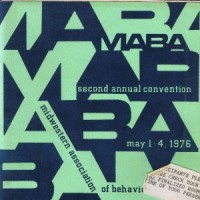Response Deprivation, Reinforcement, and Punishment (1978)

©1978 by John C. Malone, Kathy McNally, Dallas Denny, and John Hinson.
Source: Malone, John C., McNally, Kathy, Denny, Dallas, & Hinson, John. (1978). Paper presented at the Midwest Association of Behavior Analysis Second Annual Convention, Chicago, IL, 1-4 May, 1978.
This was my second presentation at a professional conference.
Midwest Association for Behavior Analysis (PDF)
About This Paper
This presentation was my second ever. It was given while I was in a graduate psychology program at the University of Tennessee in Knoxville. Kathy and John were fellow graduate students. John C. Malone was our mentor; the three of us worked in his lab, doing operant conditioning experiments with pigeons . Both Kathy and John have had distinguished careers. Kathy is on the faculty of both the American Compensation Association and the Society for Human Resource Management and a a member of the English department of CERAN Lingua in Spa, Belgium. John Hinson is a professor at the University of Washington. Dr. Malone is a professor at the University of Tennessee.
Dr. Malone was brilliant and a bit of a rascal. Once I let him know I would be late for class on the history of psychology. He okayed it, but when I tiptoed into the the back of the huge classroom he called me out. “Dallas! How nice of you to come!”
In the spring of 1978 he took us to Chicago for our presentation on schedules of reinforcement. There, I heard the late B.F. Skinner speak. Ever the behaviorist, he started his keynote speech this way: “When I’m reading a book and I come to a description of a dream, I skip it.”
Response Deprivation, Reinforcement, and Punishment (Abstract)
©1978 by John C. Malone, Kathy McNally, Dallas Denny, and John Hinson.
Source: Malone, John C., McNally, Kathy, Denny, Dallas, & Hinson, John. (1978). Paper presented at the Midwest Association of Behavior Analysis Second Annual Convention, Chicago, IL, 1-4 May, 1978.
Response Deprivation, Reinforcement, and Punishment
John C. Malone
Kathy McNally
Dallas Denny
John Hinson
University of Tennessee, Knoxville
In several experiments pigeons received equal (variable-interval) reinforcement for responding in two alternated components of a multiple schedule. During baseline training the length of each component was fixed at one minute and timeout periods separated components. Subsequent changes in component length, with no change in reinforcement contingencies, produced both “reinforcement” and “punishment” effects. Both effects depended only upon restrictions placed on the opportunity to respond in one of the components. These and other data suggest that an analysis similar to Premack’s definition of reinforcement applies to common multiple schedule behavior, though Premack’s definition of the relationship involved may be overly restrictive.
